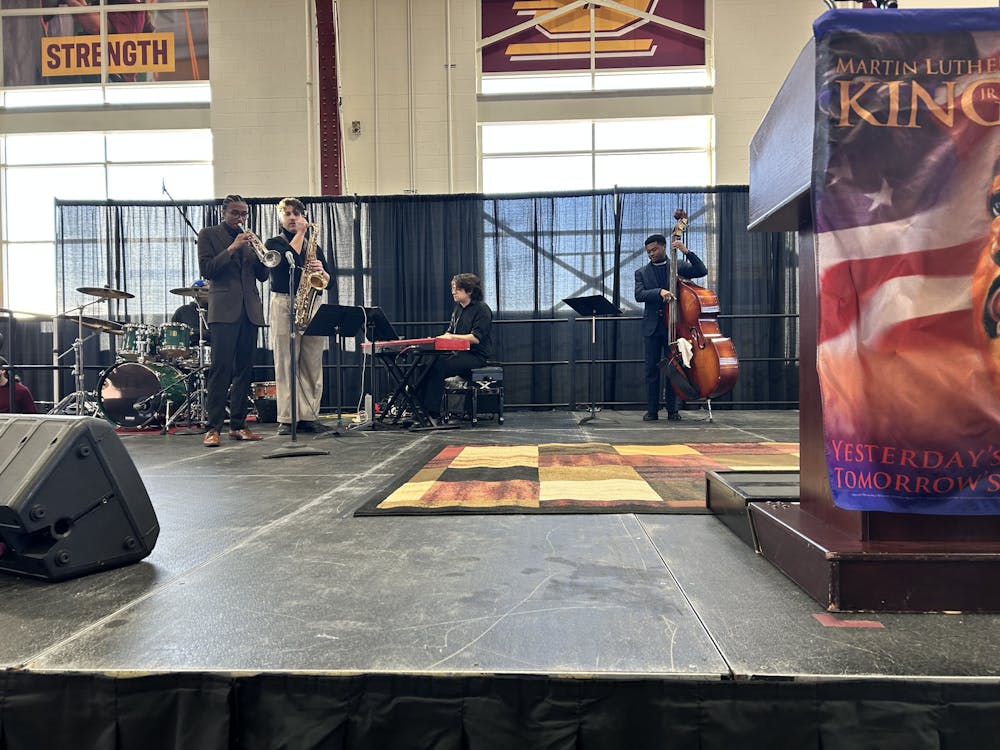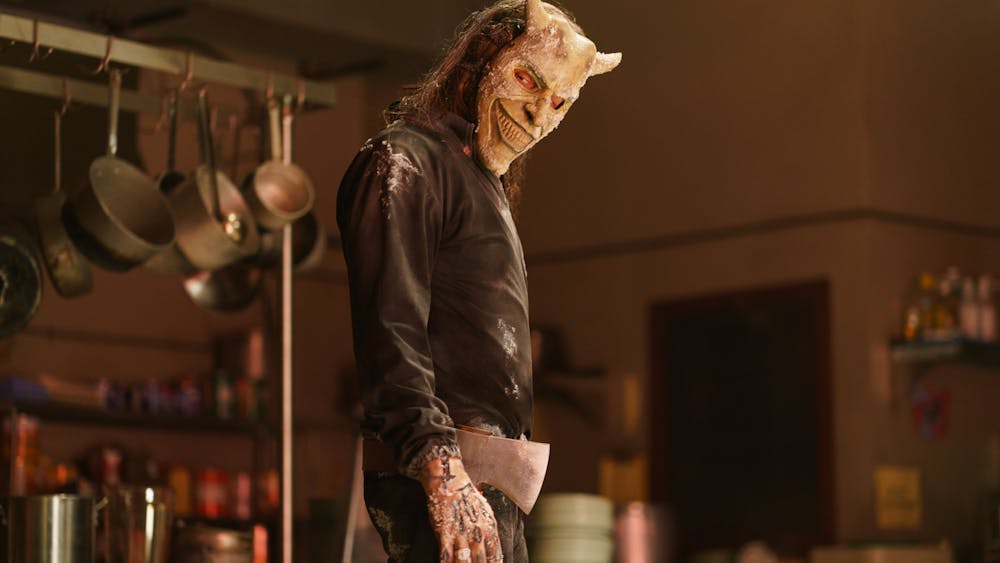Martin Luther King Jr's enduring legacy
Honoring MLK at the CommUNITY Peace Brunch

Members of the CMU Jazz Collective getting prepared to perform in Finch Fieldhouse for the CommUNITY Peace Brunch on Jan. 20, 2024. (CM Life | Corey Hogue)
Packed, lively and bustling are some of the many words that can be used to describe the attendance inside Finch Fieldhouse on the particularly harsh cold of the Monday morning.
People still flowing into the event found themselves arriving in the glow of trumpets, saxophones, and drums radiating from the central stage as the Jazz Collective occupied its placement in the middle of Finch with its back towards the wall as the still significant amount of people still drifted from the insidious wind chill.
This was where the CommUNITY Peace Brunch was held on Jan. 20. The event was organized by the Multicultural Academic Students Services (MASS) for students, faculty and members of the wider Mount Pleasant community for them to engage together to honor and celebrate the memory of Martin Luther King Jr.
Multiple speakers, including Michigan State Senator and Central Michigan University alumni Sarah Anthony spoke during the brunch along with musical performances by the CMU Jazz Collective and Christ Central Choir.
Jay Weddle, freshman student and member of the MASS program sat close to the right side of the stage, not long after the Christ Central Choir sung the Black National Anthem, said that honoring MLK’s memory and enduring legacy is important as we move forward.
Weddle said that the event’s nature, it being an open, non-restrictive and inclusive gathering, is a point in itself of MLK’s work.
“It’s just nice to have a event that everyone’s kinda coming together to celebrating as a whole, that not restrictive to any group and just open to anybody at the school,” he said. “It really shows the purpose of what MLK actually fought for because we’re all coming together, just to be unified and celebrate each other."
Weddle said the brunch is an opportunity for all students at CMU’s campus and the wider Mount Pleasant community to dine together, listen together and build rapport with each other in spirit of fellowship.
CMU department and program members sat at tables draped with black coverings, each table having name cards denoting reservations. The guests listened to soft jazz before the first remarks from Paula Lancaster, the interim provost and executive vice president of Central Michigan University, spoke. She was the first of many speakers on MLK’s legacy and its importance.
Lancaster spoke of MLK’s continuing message of unity and his commitment to public service, using his dream of unity of purpose and justice as a call to recognize our and each other’s humanity to go beyond ourselves.
“We would also learn that unity is the opposite of division, which is characterized by disagreement and separation, and of course divisiveness,” Lancaster said. "I need not overstate the fact that far often in our society, we are encouraged to focus a bit more on division and divisiveness, rather than on the ways in which we can find commonality.
“Dr. King was very careful to point out that unity has never meant in deformity," she said. "We all don’t have to think alike or believe the same things to find unity of purpose."
The keynote speaker of the event was Michigan State Senator and CMU Alumni Sarah Anthony from the state's 21st District. She spoke about how her experiences from life and her time at CMU inspired her to devote herself to public service to serve her hometown of Lansing and the entire state of Michigan.
Anthony first spoke about her position of being the granddaughter of two men who went through incredible and needless hardship simply because of the color of their skin. Her grandfather on her father's side was a sheriff’s deputy in East Saint Louis, Illinois who signed up to serve his community but due to being denied accommodations and benefits that were given to his white counterparts due to racism forced him to live in poverty with his seven children and wife.
She said on her mother’s side, her grandfather was a veteran who had served his country only to come back home and be denied the rewards of service that his white counterparts were granted, such as receiving a free college education and resources for being able to buy a home.
“This is the lineage I come from," Anthony said. "It’s a mixed bag, right? People who want to believe into the promise of this country, who still sign up to serve a country and a community that often doesn’t see us (African Americans) as human or see us a worthy of the benefits of the country."
Anthony said she came to Mount Pleasant as a first-generation college student with parents who had no experience but nevertheless wanted to "plant the seeds of opportunity" in their daughter.
Anthony started her CMU experience in 2002/2003 and settled into the dorms in present-day Campbell Hall. She said she first felt "othered" at CMU by the experience of one of her roommates' parents looking at her family picture. Anthony said she remembers her roommates' father remarking that upon seeing the photo, he was going to get his daughter a lock or/and a safe "just in case she steals."
It was this event, among discovering a sign with swastika recruiting for neo-Nazis for a registered-student organization on a billboard in the University Center, opening up CM Life after someone died at a party to see caricatures of African American football players made to "look like thugs and murderers," she said.
The one time where she allowed herself to go to a party that wasn't thrown by a Greek organization, she went with her roommates to a party to find the hosts engaging in blackface.
"Folks that love our music and our culture but also mock our skin color and our existence," Anthony said, made her feel like she "didn't belong."
Anthony said that she didn't realize it then, but her CMU experience was informing her of her "life mission" of service.
After these experiences, Anthony said she organized safe spaces for students' expression and helped bring the National Association for the Advancement of Colored People, or the NAACP, to create a chapter at CMU.
"These are moments that shaped me, and that built my belief that service was going to be the life that I was going to" she said. "Shirley Chisholm mentioned that service is the price you pay for the privilege of living on the earth, and Dr. King mentioned that everyone can be great because everyone can serve.
"It doesn't require creed," Anthony said. "It doesn't require any type of credential, just to think outside of yourself and think about the life you need to serve."
Weddle, and by extension the Multicultural Academic Student Services, said they would like those gathered here at Finch to leave with a sense of accomplishment at progress made and a determination for further work to be done.
“We should appreciate the progress we made so far and continue to take steps to make even more progress because this isn’t the end of it,” Weddle said.






